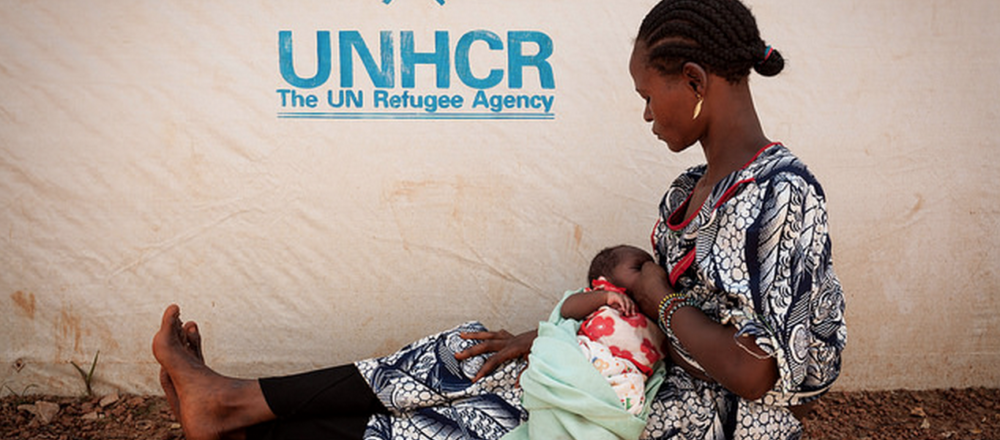The year 2014 seems likely to go down as one of the worst in recent humanitarian history.
Armed conflicts in countries such as the Central African Republic, Iraq, South Sudan, Syria and Ukraine have killed many thousands of people and forced millions more from their homes. More than 50 million people around the world have now been displaced by violence, the largest number since the end of the Second World War.
Longstanding crises in Afghanistan, the Democratic Republic of Congo and Somalia have still not been resolved, leaving large numbers of refugees and other displaced people in limbo. In the Kenyan refugee camp of Dadaab, more than 6,000 mostly Somali refugee children have now been born to parents who were themselves born in the camp.
New forms of violence and large-scale displacement are emerging in many countries around the world. In Mexico, more than a million people have been displaced by the activities of armed gangs and drug cartels. In Nigeria, the militant Islamists of the Boko Haram group have driven thousands of people out of their homes, a situation exacerbated by the heavy-handed response of the country’s military forces.
And to make the situation even worse, states across the world are running roughshod over some fundamental human rights and humanitarian principles.
In Europe, for example, the United Kingdom turned its back in October on the longstanding maritime principle that people who take to the sea should be rescued when they are in distress. Providing British support to international search and rescue operations, the government argues, would act as a “pull factor” for more refugees and other undocumented migrants to make the dangerous passage from North Africa to Europe.
In Saudi Arabia, thousands of foreign nationals, including many Somali citizens who have a valid claim to refugee status in view of the continuing conflict in their country, have been deported from the country, often in very abusive circumstances including the use of force and prolonged detention in appalling conditions. The United Nations and international community have been strangely silent about these human rights violations.
And Australia, a founding member of the international refugee protection system, has sunk to new depths in its efforts to obstruct and deter the arrival of asylum seekers from war-torn and authoritarian states. A key principle of current Australian refugee policy is to banish asylum seekers and refugees to remote and hostile locations such as Cambodia, Nauru and Papua New Guinea in the hope that they will ask to be returned to their country of origin – even if it is not safe for them to do so. According to one former Manus Island employee, it is “an experiment in the active creation of horror.”
In such turbulent circumstances, the United Nations and its member states have tended to focus public attention on the levels of funding which they need to assist the victims of recent emergencies. And it has been impressive to witness the increase in global humanitarian spending, much of it provided by industrialised states that are still struggling to emerge from the economic depression of the past five years.
But it has also become increasingly clear that humanitarian action alone cannot resolve the conflicts that force people to abandon their homes. Nor can it provide the victims of violence a safe sanctuary if states are unwilling to offer them asylum.
As well as focusing on the provision of humanitarian aid to those who are in desperate need of it, the international community should also be concentrating on the complete absence of accountability enjoyed by those individuals who have contributed to the tumultuous nature of the contemporary world.
“Political rather than humanitarian leaders must assume primary responsibility”
In several developing and middle-income countries, South Sudan being the most disturbing example, political and community leaders consistently put their personal and sectarian interests above those of the people who are suffering from the subsequent chaos around them.
Amongst the world’s more prosperous states, politicians engage in military interventions without giving adequate forethought to the longer term consequences of their actions. Would the atrocities now being committed by the so-called Islamic State be happening had it not been for the allied invasion of Iraq in 2003?
And across the globe, there are countries – and Australia is one of them – that purport to espouse the principles of international human rights and refugee protection, but which in practice seek to avoid the responsibilities that those principles entail. In the despicable and disingenuous words of former Immigration Minister Scott Morrison, the government’s crackdown on refugee rights is simply an attempt to “strip people-smugglers of a product to sell” and to “take the sugar off the table.”
There is much to be said for recent efforts to ensure that refugees and displaced people are able to benefit from minimum humanitarian standards with respect to the shelter, food, sanitation and other life-savings services which they receive after disaster strikes.
But in focusing on such standards, we should not forget that our ultimate goals must firstly be to prevent and resolve those situations in which people are forced to flee for their lives, and secondly to ensure that they are able to find a safe refuge. And in that respect, political rather than humanitarian leaders must assume primary responsibility.
In the recent words of UN High Commissioner for Refugees Antonio Guterres: “Some political leaders believe that they can trigger conflicts because then the humanitarians will come and clean up the mess. We are no longer able to clean up the mess, to pick up the pieces.”
—
Jeff Crisp is Senior Director for Policy and Advocacy at Refugees International. He is based in the UK.
Feature image: UNHCR/Flickr



